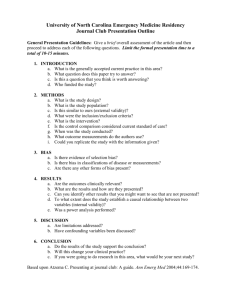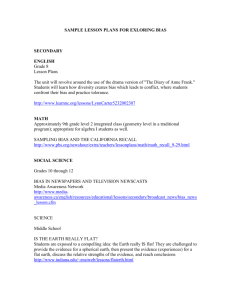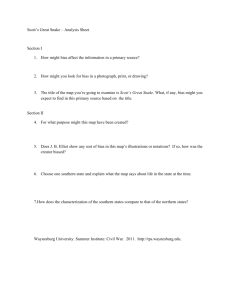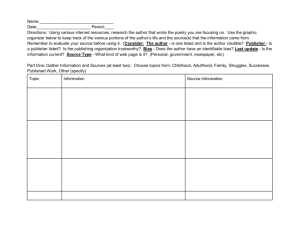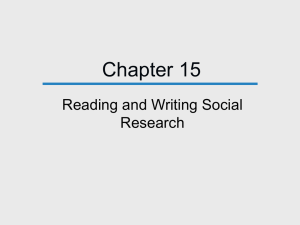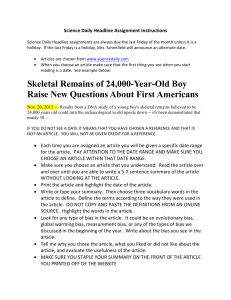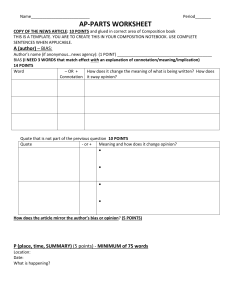Handout
advertisement
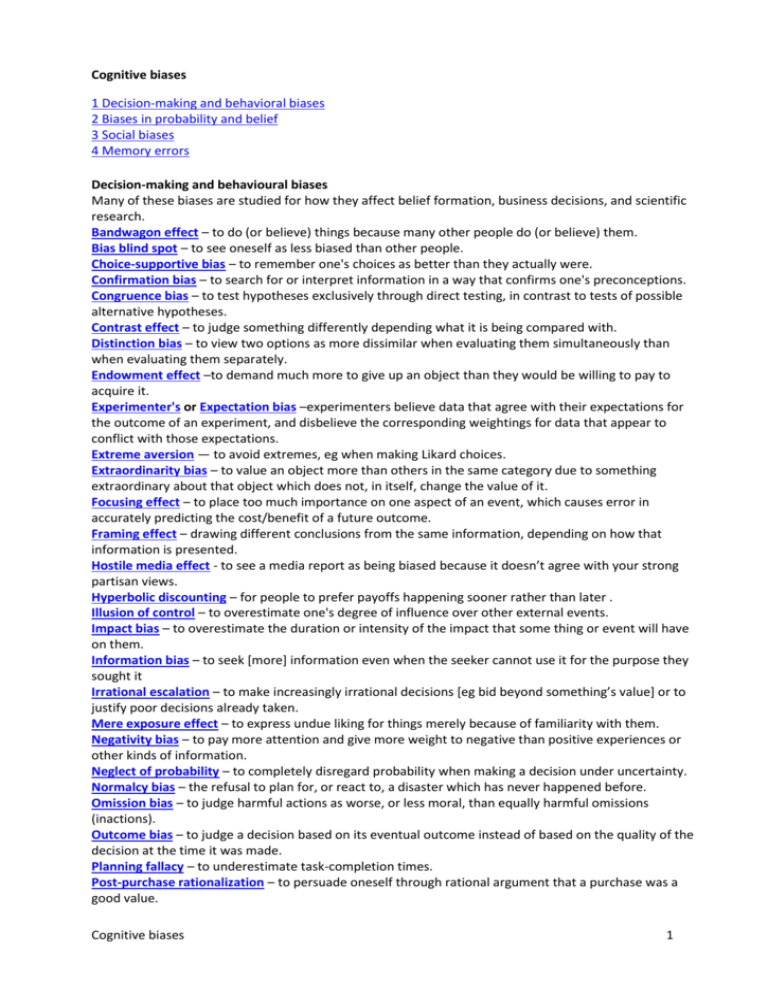
Cognitive biases 1 Decision-making and behavioral biases 2 Biases in probability and belief 3 Social biases 4 Memory errors Decision-making and behavioural biases Many of these biases are studied for how they affect belief formation, business decisions, and scientific research. Bandwagon effect – to do (or believe) things because many other people do (or believe) them. Bias blind spot – to see oneself as less biased than other people. Choice-supportive bias – to remember one's choices as better than they actually were. Confirmation bias – to search for or interpret information in a way that confirms one's preconceptions. Congruence bias – to test hypotheses exclusively through direct testing, in contrast to tests of possible alternative hypotheses. Contrast effect – to judge something differently depending what it is being compared with. Distinction bias – to view two options as more dissimilar when evaluating them simultaneously than when evaluating them separately. Endowment effect –to demand much more to give up an object than they would be willing to pay to acquire it. Experimenter's or Expectation bias –experimenters believe data that agree with their expectations for the outcome of an experiment, and disbelieve the corresponding weightings for data that appear to conflict with those expectations. Extreme aversion — to avoid extremes, eg when making Likard choices. Extraordinarity bias – to value an object more than others in the same category due to something extraordinary about that object which does not, in itself, change the value of it. Focusing effect – to place too much importance on one aspect of an event, which causes error in accurately predicting the cost/benefit of a future outcome. Framing effect – drawing different conclusions from the same information, depending on how that information is presented. Hostile media effect - to see a media report as being biased because it doesn’t agree with your strong partisan views. Hyperbolic discounting – for people to prefer payoffs happening sooner rather than later . Illusion of control – to overestimate one's degree of influence over other external events. Impact bias – to overestimate the duration or intensity of the impact that some thing or event will have on them. Information bias – to seek [more] information even when the seeker cannot use it for the purpose they sought it Irrational escalation – to make increasingly irrational decisions [eg bid beyond something’s value] or to justify poor decisions already taken. Mere exposure effect – to express undue liking for things merely because of familiarity with them. Negativity bias – to pay more attention and give more weight to negative than positive experiences or other kinds of information. Neglect of probability – to completely disregard probability when making a decision under uncertainty. Normalcy bias – the refusal to plan for, or react to, a disaster which has never happened before. Omission bias – to judge harmful actions as worse, or less moral, than equally harmful omissions (inactions). Outcome bias – to judge a decision based on its eventual outcome instead of based on the quality of the decision at the time it was made. Planning fallacy – to underestimate task-completion times. Post-purchase rationalization – to persuade oneself through rational argument that a purchase was a good value. Cognitive biases 1 Reactance – the urge to do the opposite of what someone wants you to do out of a need to resist a perceived attempt to constrain your freedom of choice. Restraint bias – to overestimate one's ability to show restraint in the face of temptation. Selective perception – for expectations to affect perception, eg believing you are drunk when you have drunk a non-alcoholic drink when you believe it contains alcohol. Like placebo effect. Semmelweis reflex – to reject new evidence that contradicts an established paradigm. Social comparison bias – the tendency, when making recruiting, to favour potential candidates who don't compete with one's own particular strengths. Status quo bias – to like things to stay relatively the same, even when beneficial things are available. Unit bias — to want to finish a given unit of a task or an item, even when you have used/consumed enough of it. Wishful thinking –forming beliefs and making of decisions based on what is pleasing to imagine instead of basing it on evidence or rationality. Zero-risk bias – preference for eliminating risk. Consequently more effort is made reducing a small risk to zero than making a greater reduction in a larger risk. Biases in probability and belief Many of these biases are often studied for how they affect business and economic decisions and how they affect experimental research. Ambiguity effect – people tend to select options for which the probability of a favourable outcome is known, over an option for which the probability of a favourable outcome is unknown Anchoring – to over-value a piece of information when making decisions Attentional bias – to neglect relevant data when assessing a correlation or association. Authority bias – to value something because an authority figure/expert does. Availability heuristic – estimating what is more likely by what is more available in memory, which biases toward vivid, unusual, or emotionally charged examples. Availability cascade – a self-reinforcing process in which a collective belief gains increasing plausibility through its increasing repetition in public discourse: "repeat something enough and it will become true" Base rate neglect– to base judgments on specific information, ignoring general statistical trends. Belief bias – an effect where someone's evaluation of the logical strength of an argument is biased by the believability of the conclusion. Clustering illusion – to see patterns where actually none exist. Conjunction fallacy – to assume that specific conditions are more probable than general ones Gambler's fallacy – to think that future probabilities are altered by past events, when in reality they are unchanged, eg the next coin toss won’t be heads because most previous tosses were heads. Illusory correlation – inaccurately perceiving a relationship between two events, either because of prejudice or selective processing of information. Observer-expectancy effect – when a researcher expects a given result and therefore unconsciously manipulates an experiment or misinterprets data in order to find it– prevented by double-blind testing. Optimism bias – to be over-optimistic about the outcome of planned actions. Ostrich effect – ignoring an obvious (negative) situation. Overconfidence effect – excessive confidence in one's own answers to questions. Totally. Positive outcome bias –overestimate the probability of a favourable outcome. Pareidolia – perceiving vague or random things as significant, eg seeing shapes in clouds. Pessimism bias – for some people, especially those suffering from depression, to overestimate the likelihood of negative things happening to them. Primacy effect – to weigh initial events more than subsequent events. Recency effect – to weigh recent events more than earlier events. Stereotyping – expecting a member of a group to have certain characteristics without having actual information about that individual. Subadditivity effect – to judge probability of the whole to be less than the probabilities of the parts. Subject-expectancy effect - a subject expects a given result and therefore unconsciously manipulates an experiment or reports the expected result – prevented by blind testing. Cognitive biases 2 Subjective validation – perception that information correct if it has any personal meaning or significance to them, consequently they will perceive two unrelated events (i.e., a coincidence) to be related because their personal belief demands that they be related. Well travelled road effect – underestimation of the duration taken to traverse oft-travelled routes and over-estimate the duration taken to traverse less familiar routes. Social biases Most of these biases are labeled as attributional biases. Dunning–Kruger effect – the less competent/intelligent overrate their capabilities [illusory superiority], but don’t have the ability to see it. The competent/intelligent underrate their capabilities [illusory inferiority]. Egocentric bias –when people claim more responsibility for themselves for the results of a joint action than an outside observer would. Forer effect (aka Barnum effect) – people give high accuracy ratings to descriptions of their personality that supposedly are tailored specifically for them [especially if favourable], but are in fact vague and general enough to apply to a wide range of people. For example, horoscopes. False consensus effect –people overestimate the degree to which others agree with them. Fundamental attribution error –Actor–observer bias – perceiving that others’ behaviour is more influenced by their personality and less influenced by their situation. But perceiving that your own behaviour is less influenced by your personality and more influenced by your situation. Halo effect – for a person's positive or negative traits to "spill over" from one area of their personality to another in others' perceptions of them, eg attributing intelligence to tall people. Herd instinct –adopt the opinions and follow the behaviours of the majority to feel safer and to avoid conflict. Illusion of asymmetric insight – people perceive their knowledge of their peers to surpass their peers' knowledge of them. Illusion of transparency – people overestimate others' ability to know them, and they also overestimate their ability to know others. Illusory superiority – overestimating one's desirable qualities, and underestimating undesirable qualities, relative to other people. Ingroup bias –people give preferential treatment to others they think are in their own group. Just-World phenomenon – for people to believe that the World is just and therefore people "get what they deserve." Moral luck –when making moral judgements, people assigned moral blame or praise based on the outcome of an event rather than the intention. Outgroup homogeneity bias – individuals see members of their own group as being relatively more varied than members of other groups. Projection bias –unconsciously assuming that others share one's current emotional states and values. Self-serving bias – to claim more responsibility for successes than failures; to interpret ambiguous information in a way beneficial to their interests. Trait ascription bias –people view themselves as relatively variable in terms of personality, behaviour and mood while viewing others as much more predictable. Ultimate attribution error – similar to the fundamental attribution error, in this error a person is likely to make an internal attribution to an entire group instead of the individuals within the group. Memory bias Beneffectance: perceiving oneself as responsible for desirable outcomes but not responsible for undesirable ones Consistency bias – incorrectly remembering one's past attitudes and behaviour as resembling present attitudes and behaviour. Cryptomnesia – a form of misattribution where a memory is mistaken for imagination. Egocentric bias – recalling the past in a self-serving manner. False memory – confusion of imagination with memory, or of true memories with false memories. Hindsight bias –where you see past events as being predictable: "I-knew-it-all-along" Cognitive biases 3 Reminiscence bump – the effect that people tend to recall more personal events from adolescence and early adulthood than from other lifetime periods. Rosy retrospection – to rate past events more positively than they had actually rated them when the event occurred. Suggestibility –ideas suggested by a questioner are mistaken for memory. Telescoping effect —recent events appear to have occurred more remotely and remote events appear to have occurred more recently. Von Restorff effect — where extraordinary events/things are remembered more than others. Information taken from wikipedia Cognitive biases 4
